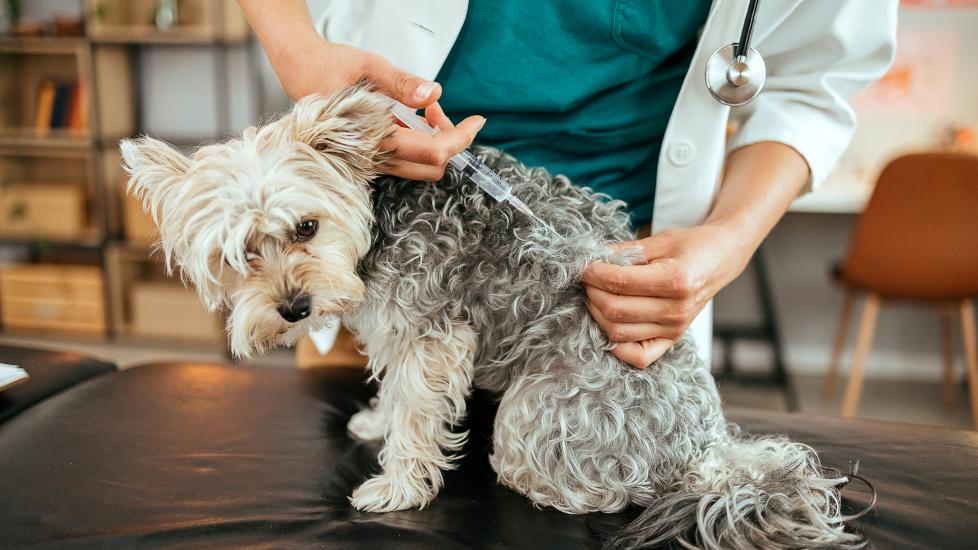Librela™ For Dogs
eclipse_images/E+ via Getty Images via Getty Images
PetMD’s medications content was written and reviewed by veterinary professionals to answer your most common questions about how medications function, their side effects, and what species they are prescribed for. This content shouldn’t take the place of advice by your vet.
What Is Librela™?
Librela™ (bedinvetmab) injection is the first and only anti-nerve growth factor (NGF) monoclonal antibody (mAb) therapy for the control of pain associated with osteoarthritis in dogs. It is an injection given to your dog once a month by your veterinarian, typically in a vet office setting.
Librela™ Considerations
Librela™ should not be administered to dogs with known hypersensitivity to bedinvetmab. It should also not be used in breeding, pregnant, or lactating dogs.
Librela™ has not been evaluated in dogs with a history of cruciate ligament rupture in the past 6 months or in dogs less than 12 months old.
It is important to note that dogs may develop anti-bedinvetmab antibodies, which can result in Librela™ injections losing their effectiveness over time.
Librela™ is approved only for dogs at this time and should not be used in any other species.
How Librela™ Works
Bedinvetmab is the active ingredient in Librela™. It is classified as a monoclonal antibody, which is a lab-made protein developed to target certain parts of the body.
In dogs with osteoarthritis (OA), cartilage breaks down in the joints, which causes the bones to rub together and cause pain. Bedinvetmab specifically binds to a protein messenger called nerve growth factor (NGF), which blocks its ability to communicate pain signals to the brain, thereby preventing the dog from feeling pain.
Librela™ Directions
Librea™ is available only by prescription and must be administered at a veterinary practice. It is not available for administration at home because your vet’s professional expertise is needed to properly diagnose pain associated with osteoarthritis in your dog, administer the injection, and monitor the safe use of Librela™.
Librela™ is given as an under-the-skin (subcutaneous) injection once a month, and the dosage is determined by your dog’s weight.
Missed a Dose?
If you forget to bring your dog in for their monthly injection, please contact your veterinarian. They will typically schedule an appointment for your dog every four weeks to administer the injection and observe your dog’s response to Librela™.
Librela™ Possible Side Effects
Librela™ is generally well tolerated in dogs. Side effects are uncommon but may include:
-
Pain at the injection site
-
Bacterial skin infection
-
Abnormal skin at the injection site (dermatitis)
-
Abnormal urination
-
Urinary tract infection
-
Vomiting
-
Weight loss
-
Elevated BUN kidney level
-
Loss of effectiveness over time
Human Side Effects
Librela™ is not an approved medication for humans and accidental injection may cause harm. Women who are pregnant, breastfeeding, or trying to conceive should take extreme care to avoid accidental self-injection. Allow veterinary staff to hold and position your dog upon administration by your veterinarian.
Hypersensitivity reactions, including anaphylaxis, could potentially occur in the case of accidental self-injection. If an accidental self-injection occurs, seek medical advice immediately and show the package leaflet or the label to the physician.
Call Your Vet If:
- Severe side effects are seen (see above)
- Your pet’s condition worsens or does not improve with treatment
- You see or suspect an overdose
- You have additional questions or concerns about the use of Librela™
Librela™ Overdose Information
Signs of a Librela™ overdose may include gastrointestinal issues (vomiting, soft stools) or skin issues (scabs on the face, abnormal skin at the site of the injection).
If you suspect an overdose, immediately contact your veterinarian, seek emergency veterinary care, or call an animal poison control center. Consultation fees often apply
Pet Poison Helpline (855) 764-7661
ASPCA Animal Poison Control (888) 426-4435
Librela™ Storage
Your veterinarian will need to store Librela™ in the refrigerator at temperatures from 35 to 46 F.
Do not freeze Librela™ and make sure to protect it from light.
Always confirm storage requirements by reading the prescription label. Keep out of reach of children and pets.
Librela™ for Dogs FAQs
How much does Librela™ cost for a dog?
The cost for Librela™ injections mostly depends on your dog’s weight and the dosage required. The cost can vary slightly depending on your individual veterinary hospital’s prices in the region where you live.
What is Librela™ used for in dogs?
Librela™ (bedinvetmab) injection is the first and only anti-nerve growth factor (NGF) monoclonal antibody therapy for the control of pain associated with osteoarthritis in dogs.
Is Librela™ only available through a veterinary practice?
Librela™ is available only by prescription and must be administered at a veterinary practice. It is not available, at this time, to be given at home.
No vet writer or qualified reviewer has received any compensation from the manufacturer of the medication as part of creating this article. All content contained in this article is sourced from public sources or the manufacturer.
References
Corral MJ, Moyaert H, Fernandes T, et al. A prospective, randomized, blinded, placebo-controlled multisite clinical study of bedinvetmab, a canine monoclonal antibody targeting nerve growth factor, in dogs with osteoarthritis. Veterinary Anaesthesia and Analgesia. 2021;48(6):943-955.
Krautmann M, Walters R, Cole P, et al. Laboratory safety evaluation of bedinvetmab, a canine anti-nerve growth factor monoclonal antibody, in dogs. Veterinary Journal. 2021;276:105733.
